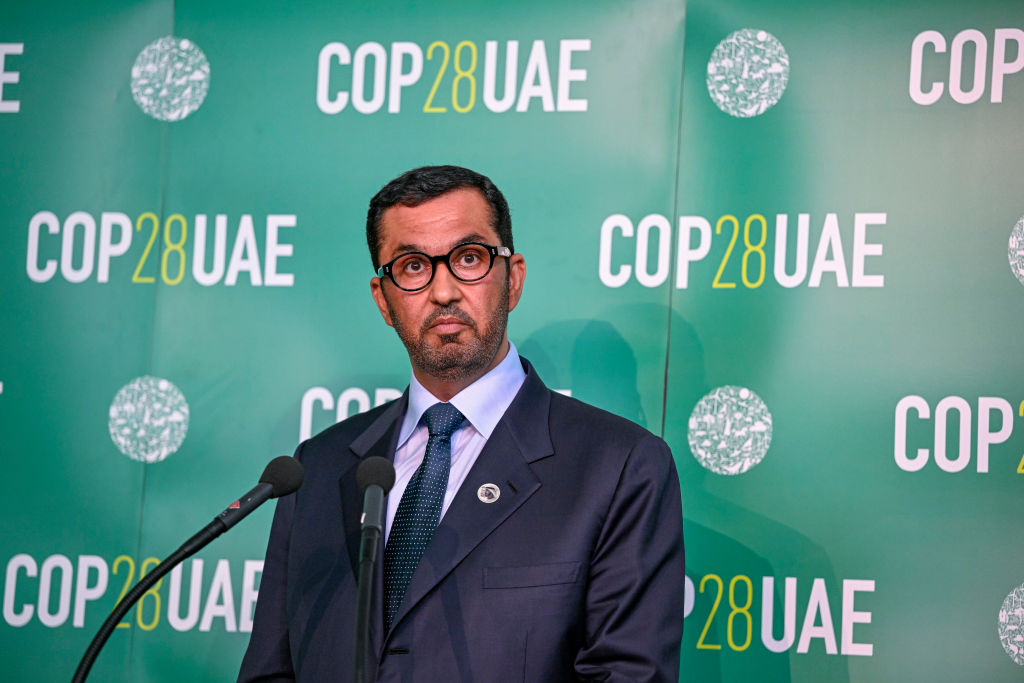
Alarm bells sounded earlier this week for observers of this year’s U.N. COP28 climate conference following the revelation that oil CEO Sultan Al Jaber had used his position as president of the talks to push his company’s fossil fuel interests. Leaked slides, published by the BBC, show his talking points for meetings with climate envoys from other countries that include offers to develop oil and gas projects.
For some, the report was a realization of their greatest fears. In their view, Al Jaber is using the climate platform to disguise a dirty, polluting agenda. For others, it was shocking but not surprising. Al Jaber is, after all, the CEO of the state-owned Abu Dhabi National Oil Company (ADNOC), and continues to oversee the 3 million barrels of oil the country produces every day.
In the past, outrage over Al Jaber being appointed to lead COP28 has led to calls for him to resign from that role, which he has summarily rejected. Now, of course, with the international conference kicking off on Nov. 30, it’s too late for such a move. But that doesn’t mean the revelation doesn’t matter. The unyielding criticism—intensified by the latest news—has placed Al Jaber and his team under enormous pressure to deliver a deal at the talks that acknowledges the urgency of cutting fossil fuels, including oil and gas. A failure to do so would not just spell trouble for efforts to address climate change but also for the whole United Nations climate process.
To make sense of the hubbub over Al Jaber’s talking points, it’s helpful to understand the role of COP president and how Al Jaber has approached it. Every year, the country hosting the U.N. climate talks designates an official from its own government to serve as COP president. These figures are typically government ministers, but they are meant to put aside their own national interest to find mutual agreement between the nearly 200 countries that participate in the talks. It’s because of the impartial nature of the role that Al Jaber’s promotion of national interest—in this case fossil fuel deals—has triggered such an outcry.
Read more: What Happens When You Put a Fossil Fuel Exec in Charge of Solving Climate Change
In my conversations with Al Jaber ahead of COP, he sought to underscore that his role is to push countries to come to an agreement, not to issue edicts. “I will be calling on all parties to engage in a collaborative manner, and to propose a solution,” he told me. “I will not be dictating.”
And yet as COP president he has significant sway to decide whose views to prioritize. Any single country can veto the deals that emerge and deciding who to listen to on particular elements of negotiation can pose a gargantuan task—one that often leaves delegates disappointed. We’ve seen this play out before. Two years ago, at COP26 in Glasgow, then-COP president Alok Sharma, who had served as U.K. Secretary of State for Business, Energy, and Industrial Strategy, made a decision in the final hours of COP to replace language referring to a “phase out” of coal to language referring to a “phase down” at the insistence of China and India. Other countries were not given a chance to respond before the deal was gavelled in, and Sharma was left to apologize through tears for the way the change occurred.
The drumbeat of criticism on Al Jaber may not have led him to resign, but it certainly has created pressure on the COP presidency to prove that it isn’t acting to favor the UAE’s oil and gas business. To do that, Al Jaber will have to thread a difficult needle, moderating not just the UAE’s interests but also those of influential oil-rich countries like Saudi Arabia that are keen to limit the scope of language seeking to phase out fossil fuels.
In September, I asked Al Jaber about the stream of criticism pointed at him. “I am genuine in addressing this,” he told me. “If you don't want to believe me, all they have to do is just wait until the COP happens. And only then I will show them.” The opportunity to make good on that is now upon us.
More Must-Reads from TIME
- How Donald Trump Won
- The Best Inventions of 2024
- Why Sleep Is the Key to Living Longer
- Robert Zemeckis Just Wants to Move You
- How to Break 8 Toxic Communication Habits
- Nicola Coughlan Bet on Herself—And Won
- Why Vinegar Is So Good for You
- Meet TIME's Newest Class of Next Generation Leaders
Write to Justin Worland at justin.worland@time.com